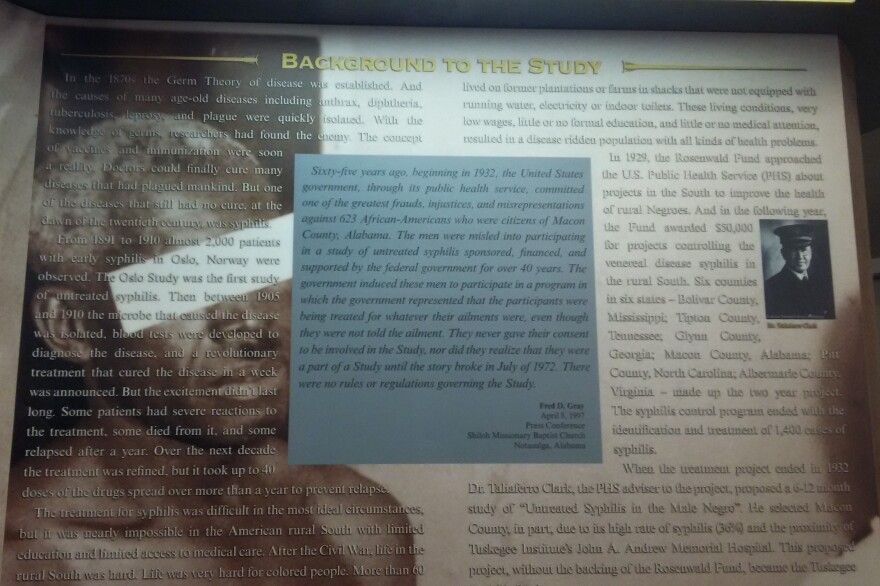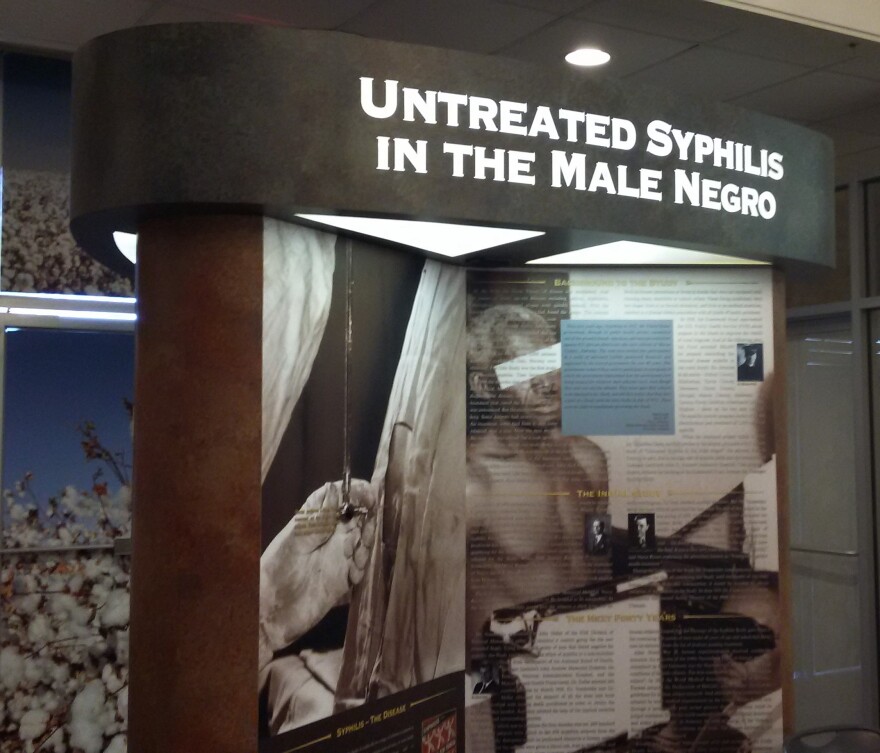All year long at Alabama Public Radio, we’ve been looking at rural health. Many of the challenges residents of these communities face are a lack of doctors and hospitals, and the money to pay for care. For many African-Americans in Alabama, a lack of trust of outsiders and the government. This issue can be traced back to a study conducted by the U.S. government on black men living around Tuskegee. This year marks a twenty year milestone in a federal study of syphilis which still resonates across the country.
“You remember the Rodney King affair right? Police beat the **** out of the guy. The Tuskegee story is the Rodney King story of medicine.”
Meet Peter Buxtun. He’s known as the whistleblower on The Tuskegee Study of Untreated Syphilis on the Negro Male. In popular culture, it’s also called the “Tuskegee Syphilis Experiment.”

Buxtun was the guest of honor at a ceremony at Tuskegee History Center. It marked the twentieth anniversary of the official White House apology for the syphilis experiment. The audience in Tuskegee included family members of the men involved in the study. They were all helped when Buxtun and the Associated Press broke the story in 1972. He says, back then, the turning point was a lunchroom chat with a co-worker at the U.S. Public Health Service.
“I’ll never forget what he was saying, he said “the patient was insane and desperate need of some kind of help, the family didn’t know what to do, they weren’t sure what was going on.””
This lead Buxtun to dig deeper. What he found was a medical conspiracy…
“There is the study being run down in this place called Tuskegee and everyone in the study is black. What’s going to happen with the civil rights movement when they find out about it, so eventually the civil rights movement found out and people were very unhappy about it.”

Buxtun uncovered a program at the Public Health Service of finding African-American men from rural Alabama who had syphilis. Instead of treating these patients, the disease was allowed to progress while researchers took notes. It had been going on since 1932. Buxtun recalls one doctor in Tuskegee who got into trouble for trying to treat one of the subjects with antibiotics…
“The poor doctor who did the right thing had the medical society and the county health authorities jump down his throat, “look what you’ve done, you treated one of these guys, and you’re not supposed to treat them.” If he had had, let’s say pneumonia, there would have been a procedure to go through, some paper work, to get permission to save the guys life for Christ’s sake…ah, you don’t know what to make out of a thing like that.”
Buxtun tipped off a reporter from the Associated Press and the story soon broke.
“While the men started out just wanting just for me to settle their lawsuit and get an apology.”

That’s attorney Fred Gray. Before Tuskegee, his client list included civil rights icon Rosa Parks.
“They wanted a permanent memorial here.”
“And without remembering it, we cannot make amends and we cannot go forward.
Gray sued, the government settled, and in 1997 President Clinton gave the subjects of the Tuskegee Syphilis Study the words they wanted to hear…
“What the United States’ government did was shameful,” said President Clinton. “And, I am sorry.”
“This is actually a copy of my great granddaddy’s death certificate, and it actually indicates that he died from syphilis…”

That is Lloyd Clements. He attended a gathering over the summer to remember the twentieth anniversary of President Clinton’s apology. Clements is from Tuskegee and several of his family members were a part of the study…

“Initially my great grandfather Dan Collis, he was a member of the Tuskegee Syphilis Study and his son, Sylvester Collis was also a part of the Tuskegee Syphilis Study and his grandson Ludie Clements was also a part.”
Clements says his family has gone through a variety of emotions being a part of one of the dark chapters of Alabama and U.S. history…
“Initially there was a lot of hurt and anger involved knowing my family was involved in it. Then the initial hurt turned to grief and sadness then finally it turned to forgiveness on my part for my family.”
Dr. Rueben Warren is a professor of Bioethics and the Director of the National Center for Bioethics and Research in Healthcare at Tuskegee University. The center was established as part of the apology from the government. Warren says there was a particular reason the men in that area were used for the study…
“People in Macon County, particularly African Americans, were vulnerable. Were vulnerable because, not because they were uneducated, but because they were under educated, not that they were poor, because many of the men were not, but many of them were low income. So there were challenges around being black in the south that made them vulnerable.”
Warren says those running the study used trusted institutions like Tuskegee University and the area churches...
“They went to Shiloh Baptist Church to pick up the men right, and what young public health students are taught and researchers are taught, if you want to get populations for your research, particularly African Americans or Hispanics, where do you go? Go to the church.”

Warren says the researchers were taking advantage of the culture of the area…
‘They were lied to, they were deceived. They were kind of being treated, they called it “Bad Blood” but I don’t know what bad blood is, so I think their willingness to continue in spite of the pain of getting spinal taps, because there was some good intent beyond their own personal benefit. I think part of it is the psyche of community.”
Warren says they couldn’t have pulled the study off somewhere else…
“Couldn’t have done on it on the west coast, new York or Chicago, different kind of community, far less trusting. So I think it was intentional picking the place and picking the people.”
Warren says there needs to be a major change in how researchers present themselves…
“We ask to be trusted but we don’t talk about trustworthiness. I would suggest that we shift the paradigm from “do you trust me?” to “am I trustworthy?” once I prove myself trustworthy, then trust comes automatic so that paradigm shift is critically important and not talked about and I think we need to talk about it.”

Because of the Public Health Service’s treatment of those involved in the syphilis study massive changes were made in the way information is gathered. Participants must be informed they are part of a study, they must be made aware of how the information will be used and what the possible effects of the study could be. However, I asked Dr. Warren if something like the syphilis study could happen today…
“Absolutely. I think there are instances of bioethics and public health ethics violations as we speak that are occurring. So you have to think about the effort of ethics particularly around health, first look at the place, the people and the principal. If you do that the principal is generalizable. It’s the difference between informed consent and consent. Are people being truly informed when they’re consenting, so we need to look at that, the review boards are important but they need to be revisited.
Warren says the study done at Tuskegee still has an impact on minorities to this day…
“Clinical trials are critical. But the proportion of African Americans, other people of color in clinical trials is terribly poor. So if we’re not engaged in clinical trials then the results of the clinical trials may not be applicable to those populations.”
The changes brought on because of the Tuskegee Syphilis study are supposed to protect the public. However, in rural Alabama, the memory of the study is still there and the lingering distrust is clearly visible.




